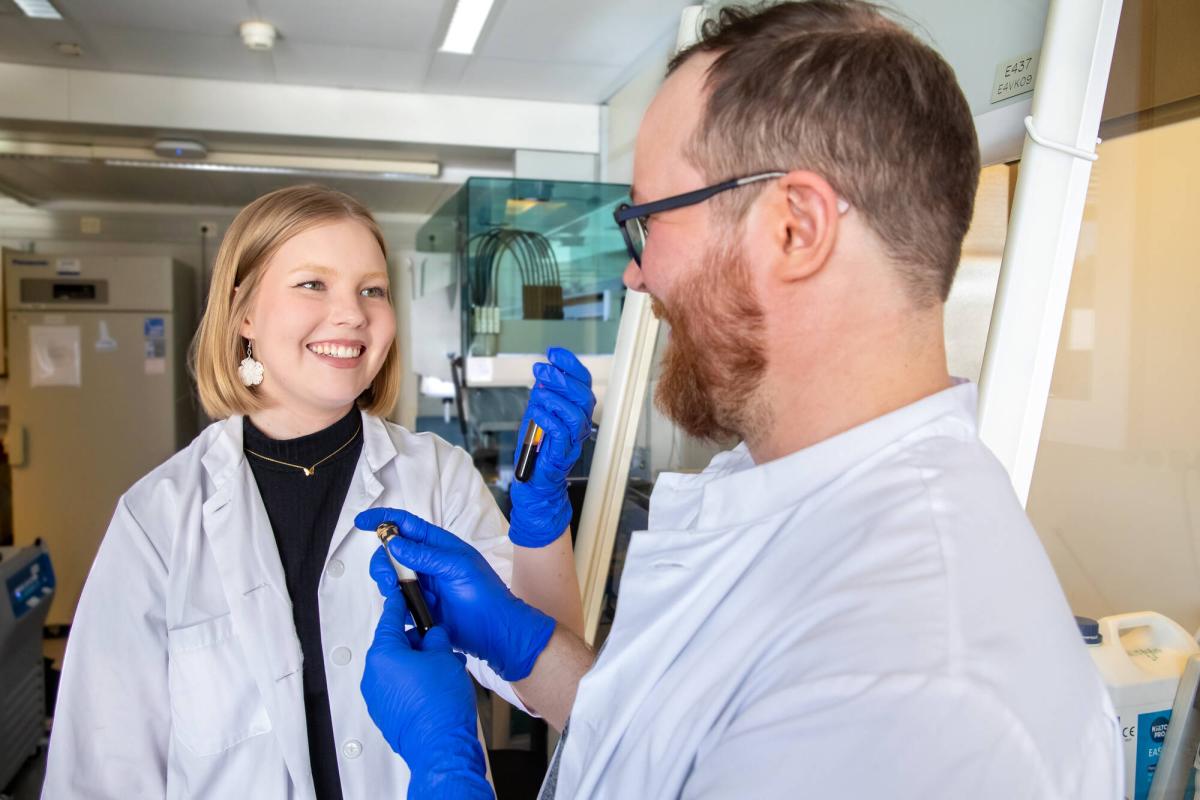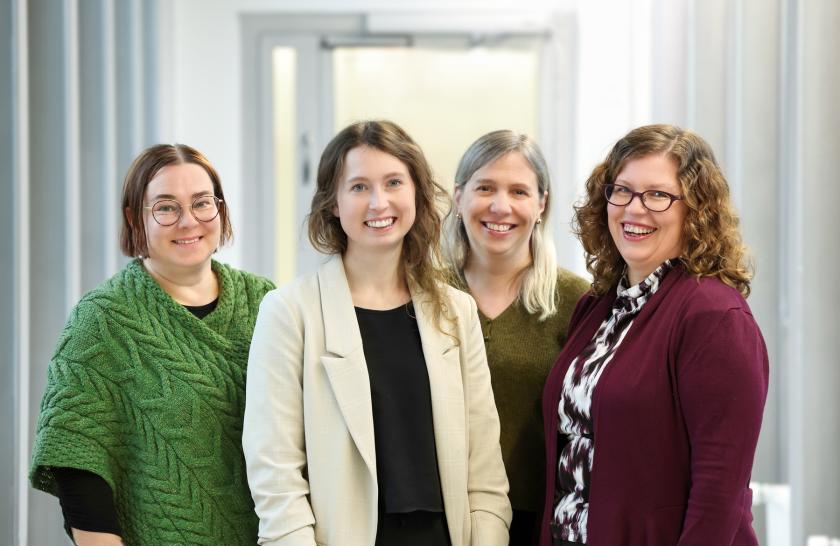HUS Diagnostic Center
Diagnostic Center is Finland's leading provider of clinical laboratory and medical imaging services.

We employ 3400 top professionals in the field. Our goal is to be the best expert in our field and to enable patient customers a good customer experience.
The Diagnostic Center has activities in eight medical specialties. We also have national responsibility for the performance of various examinations requiring specialist expertise, and for the statutory research and teaching obligations of university hospitals. We operate in primary health care and specialist medical care in Uusimaa, Kymenlaakso, and South Karelia.
We are an important part of the care chain. Laboratory and medical imaging studies play a key role in verifying and excluding disease diagnoses, in treatments and their follow-up, and in screening. We also perform procedures and treatments, such as neuromodulation treatments.
We develop our quality systematically. Apart from radiology, the Diagnostic Center is a T055 testing laboratory accredited by the FINAS Accreditation Service with accreditation requirements pursuant to SFS-EN ISO 15189:2013. Information on the accredited scopes and the included fields and units is available at www.finas.fi.
Medical Imaging Center was awarded an ISO 9001:2015 quality certificate in 2018.
Diagnostic Center's annual report 2023
Allow analytic cookies to show the embedded media.
Allow analytic cookies to show the embedded media.
More information about Diagnostic Center in this presentation:
HUS Diagnostic Center - High quality and effective diagnostics(pptx 5.19 MB) (opens in new window, links to another website)Come work with us


News
Laboratories and Imaging for professionals
On our website for professionals you will find more information on for example point-of-care testing, pharmacogenetics and our laboratories' emergency services.

Diagnostics Forum
HUS Diagnostic Center wants to be an even better partner for referring physicians. The Diagnostics Forum for health center physicians offers up-to-date training material on diagnostics to support the busy everyday work.

Our services
Specialties
The Genetics division is responsible for the Department of Clinical Genetics, the genetics laboratory, genome unit, and clinical pharmacology.
In the Department of Clinical Genetics, we focus on the diagnostics of genetic diseases, the study of the inheritance of the disease in the family, and counselling. Approximately 5,000 patients each year visit our outpatient clinic at the Skin and Allergy Hospital.
Our genetics laboratory is the largest in Finland, and we conduct approximately 50,000 genome studies every year.
In the clinical pharmacology unit, we promote the implementation of rational pharmacotherapy. The right procedures, correct information and its sharing can be used for optimizing the patient's medication and reducing unnecessary use of medication. We also act as an expert in clinical drug research, clinical pharmacotherapy and drug safety, as well as advise professionals on problems associated with patients' pharmacological therapy.
In the clinical physiology and nuclear medicine division, we study the vital functions of the human body and their disorders.
In clinical physiology, we study, for example, the functioning of the lungs, heart and esophagus through various measurements, either as short-term examination or long-term recording, as well as through various provocations. We also carry out bone mineral densitometry.
In nuclear medicine, we carry out PET-CT examinations of the whole body, brain and heart metabolism and receptors specifically to diagnose cancers and degenerative diseases and to assess the treatment response.
In addition, we perform functional imaging examinations of the bones, lungs, kidneys, and lymphatic vessels using radionuclides. In addition, radionuclides are used in treating diseases such as hyperthyroidism.
Laboratory studies in clinical chemistry play a key role in the diagnosis, monitoring, and risk assessment of diseases. Our hematological studies include blood count tests, cell morphology studies of blood and bone marrow, and leukemia diagnostics. We also carry out comprehensive laboratory studies of coagulation disorders as well as studies, for example, to determine the fluid and electrolyte balance, liver and kidney function, cardiac and inflammatory markers, and urinary chemical studies.
In addition, we carry out hormone measurements, pharmaceutical studies, and tumor marker tests, and examinations to diagnose metabolic diseases.
Our operations also include point-of-care testing activities and services. The blood centers in our hospital laboratories operate as part of the blood transfusion chain; we carry out blood transfusion studies and transmit blood products.
The Meilahti on-call automation laboratory and regional hospital laboratories (Uusimaa region, Kymenlaakso, and South Karelia) provide services at all times of the day every day of the year.
Our tasks include developing a wide range of laboratory diagnostics in accordance with clinical needs and providing services for scientific research projects.
We conduct close to a total of 19 million laboratory tests each year.
In the area of clinical microbiology, we carry out approximately 1,800,000 laboratory studies in the field of bacteriology, virology, infectious serology, autoimmune diseases, immunodeficiencies, mycobacteriology, mycology, and parasitology every year. Every year, we adopt a number of new studies for production use.
Microbiology studies play a key role in the diagnostics and monitoring of infectious and autoimmune diseases and in the investigation and prevention of epidemics.
Our cooperation with infectious-disease specialists and other physicians treating infections and immunological diseases is continuous both regionally and nationally.
In clinical neurophysiology, we examine the function and disorders of the central and peripheral nervous systems and the muscular system mainly by using electronic testing methods.
The most typical studies are electroencephalography (EEG), a measurement of electrical activity in the brain, and an electro neuromyography (ENMG), a study of nerve and muscle function. We also study sleep-disordered breathing and other sleep disorders and daytime fatigue symptoms.
In addition, we perform brain mapping to detect critical brain regions before a brain surgery, and intraoperative neuromonitoring. We also administer treatments, such as transcranial magnetic stimulation for chronic pain, and botulinum toxin injections to muscles to treat movement disorders.
In the pathology laboratories, we analyze cell and tissue samples and conduct hospital autopsies. The pathologist examines samples under a microscope and gives a statement on the sample, which is then sent to the referring physician.
Our division includes the pathology laboratories in Meilahti, Hyvinkää, Jorvi, Kymenlaakso, and South Karelia. The organ transplantation and hematology laboratory operates in connection with the Meilahti pathology laboratory.
We conduct approximately 430,000 tests every year. An important part of our work is case meetings, which are organized in cooperation with almost all the clinical specialties. We work in close cooperation with clinicians from different fields.
In the preanalytics division, we are responsible for more than 100 sampling points in Uusimaa, Kymenlaakso, and South Karelia.
We take over three million samples every year.
We perform most of the laboratory sampling on the hospital wards and in the emergency clinics. In addition to health centers and hospitals, we collect samples in care facilities, nursing homes, and at patients’ homes.
In radiology, we use imaging studies to examine the human body. Radiological examinations are widely used to verify different diseases and to monitor the effects of treatment.
The most common radiological imaging methods are X-ray imaging (such as lung, skeletal and dental imaging), ultrasound, computed tomography, magnetic resonance imaging, and various procedures.
Radiographers take the images of the patients. The specialist in radiology, or radiologist, examines the images taken and provides a report on them. Radiologists also perform ultrasound scans, radiological procedures, and angiographies.
Scientific research of the Diagnostic Center
The Diagnostic Center represents up to 20% of the research output of the entire HUS Helsinki University Hospital annually. About 20 dissertations and 600 scientific publications are completed annually.
















